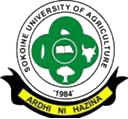Vol 81, No 2 (2014), 6 pages
Abstract
Appropriately trained Human Resources for Health (HRH) are key inputs into One Health. ‘… more than 50% of all infectious diseases of humans originate from animals and that, of the emerging diseases about 75% could be traced back to animal origin’ (Rweyemamu et al. 2006). A comprehensive understanding of the social determinants of health, through an appropriate training model for HRH, is a key input. This study aimed to explore if human and veterinary medical schools were using such a model or providing time for this model in their curricula. Specific objectives were to: determine the time that human and veterinary medical schools’ curricula provide for subjects or courses related to the social determinants of health; analyse the curricula contents to establish how they relate to the social determinants of health; and explore how a bio-medical model may influence the graduates’ understanding and practice of One Health. A review of human and veterinary graduate-level medical schools’ curricula in East Africa was performed in April 2013 and May 2013. The findings were: in the curricula, SDH contents for knowledge enhancement about One Health are minimal and that teaching is Germ Theory model-driven and partisan. Out of the total training time for physicians and veterinarians, less than 10% was provided for the social determinants of health-related courses. In conclusion, the curricula and training times provided are inadequate for graduates to fully understand the social determinants of health and their role in One Health. Furthermore, the Germ Theory model that has been adopted addresses secondary causes and is inappropriate. There is a need for more in-depth model. This article suggests that a vicious cycle of ill-health model must be taught.
Full text
Full text is available by the following link http://www.ojvr.org/index.php/ojvr/article/view/720






